阅读理解猜测词意
阅读理解备考技巧——如何有效利用上下文猜测生词意思
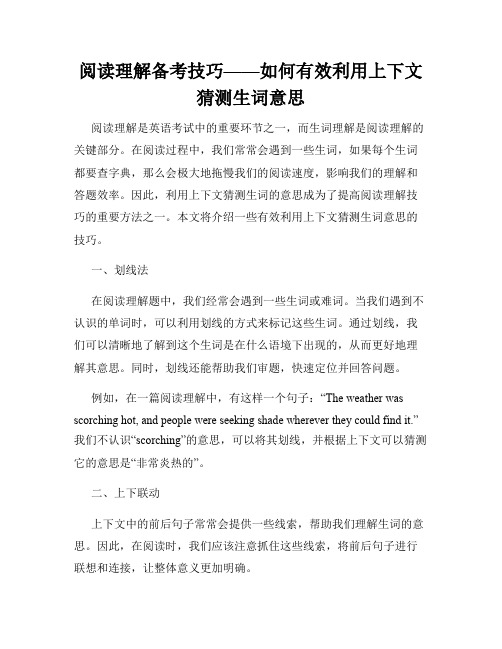
阅读理解备考技巧——如何有效利用上下文猜测生词意思阅读理解是英语考试中的重要环节之一,而生词理解是阅读理解的关键部分。
在阅读过程中,我们常常会遇到一些生词,如果每个生词都要查字典,那么会极大地拖慢我们的阅读速度,影响我们的理解和答题效率。
因此,利用上下文猜测生词的意思成为了提高阅读理解技巧的重要方法之一。
本文将介绍一些有效利用上下文猜测生词意思的技巧。
一、划线法在阅读理解题中,我们经常会遇到一些生词或难词。
当我们遇到不认识的单词时,可以利用划线的方式来标记这些生词。
通过划线,我们可以清晰地了解到这个生词是在什么语境下出现的,从而更好地理解其意思。
同时,划线还能帮助我们审题,快速定位并回答问题。
例如,在一篇阅读理解中,有这样一个句子:“The weather was scorching hot, and people were seeking shade wherever they could find it.”我们不认识“scorching”的意思,可以将其划线,并根据上下文可以猜测它的意思是“非常炎热的”。
二、上下联动上下文中的前后句子常常会提供一些线索,帮助我们理解生词的意思。
因此,在阅读时,我们应该注意抓住这些线索,将前后句子进行联想和连接,让整体意义更加明确。
例如,我们读到一篇文章的这句话:“The new museum is a magnificent edifice, attracting visitors from all over the world.”我们不认识“edifice”的意思,但可以通过上下文的‘museum’和‘attracting visitors’来猜测其意思为“建筑物”。
三、词根词缀法英语中有很多词根和词缀,通过对这些词根和词缀的了解,可以帮助我们理解生词的意思。
比如,“tele-”表示“远程”,“-graph”表示“写”,那么“telegraph”可以猜测为“电报”。
(完整版)高考英语阅读理解的猜词技巧
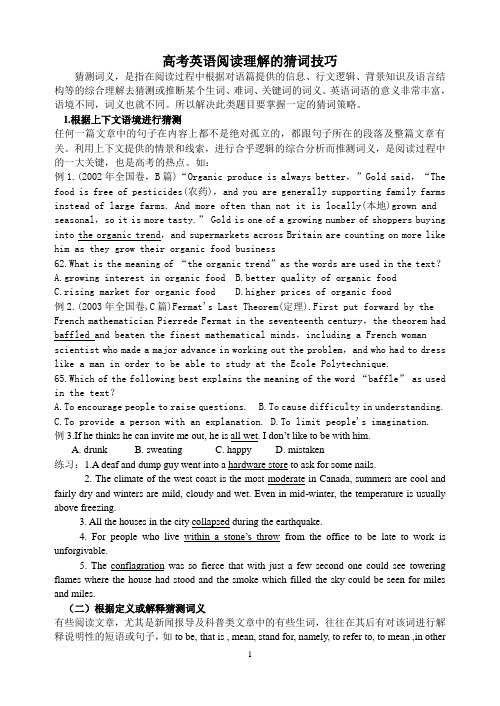
高考英语阅读理解的猜词技巧猜测词义,是指在阅读过程中根据对语篇提供的信息、行文逻辑、背景知识及语言结构等的综合理解去猜测或推断某个生词、难词、关键词的词义。
英语词语的意义非常丰富,语境不同,词义也就不同。
所以解决此类题目要掌握一定的猜词策略。
I.根据上下文语境进行猜测任何一篇文章中的句子在内容上都不是绝对孤立的,都跟句子所在的段落及整篇文章有关。
利用上下文提供的情景和线索,进行合乎逻辑的综合分析而推测词义,是阅读过程中的一大关键,也是高考的热点。
如:例1.(2002年全国卷,B篇)“Organic produce is always better,”Gold said,“The food is free of pesticides(农药),and you are generally supporting family farms instead of large farms. And more often than not it is locally(本地)grown and seasonal,so it is more tasty.”Gold is one of a growing number of shoppers buying into the organic trend,and supermarkets across Britain are counting on more like him as they grow their organic food business62.What is the meaning of “the organic trend”as the words are used in the text?A.growing interest in organic foodB.better quality of organic foodC.rising market for organic foodD.higher prices of organic food例2.(2003年全国卷,C篇)Fermat's Last Theorem(定理).First put forward by the French mathematician Pierrede Fermat in the seventeenth century,the theorem had baffled and beaten the finest mathematical minds,including a French woman scientist who made a major advance in working out the problem,and who had to dress like a man in order to be able to study at the Ecole Polytechnique.65.Which of the following best exp lains the meaning of the word “baffle” as used in the text?A.To encourage people to raise questions.B.To cause difficulty in understanding.C.To provide a person with an explanation.D.To limit people's imagination.例3.If he thinks he can invite me out, he is all wet. I don’t like to be with him.A. drunkB. sweatingC. happyD. mistaken练习:1.A deaf and dump guy went into a hardware store to ask for some nails.2. The climate of the west coast is the most moderate in Canada, summers are cool and fairly dry and winters are mild, cloudy and wet. Even in mid-winter, the temperature is usually above freezing.3. All the houses in the city collapsed during the earthquake.4. For people who live within a stone’s throw from the office to be late to work is unforgivable.5. The conflagration was so fierce that with just a few second one could see towering flames where the house had stood and the smoke which filled the sky could be seen for miles and miles.(二)根据定义或解释猜测词义有些阅读文章,尤其是新闻报导及科普类文章中的有些生词,往往在其后有对该词进行解释说明性的短语或句子,如to be, that is , mean, stand for, namely, to refer to, to mean ,in otherwords等,有时也以同位语、定语从句的形式出现,或用破折号、括号来表示,这时可利用这种关系或解释对前面或后面的词义进行猜测。
小学语文词义猜测方法

小学语文词义猜测方法语文是小学生学习的一门重要科目,而词义猜测是语文学习中必不可少的技能。
在阅读理解中,遇到不认识的生词或者短语时,我们需要通过猜测来理解其意思。
本文将介绍几种小学语文词义猜测的方法,帮助学生提高阅读理解能力。
一、根据上下文猜测词义上下文是指一个词语所在句子、段落或者篇章中的其他词语和内容。
通过仔细阅读上下文,我们可以推测出不认识的词语的含义。
例如:【例1】在一篇文章中,我们遇到了这样一个句子:“小明勇敢地走上前去。
”由于我们不认识“勇敢”这个词,但我们可以通过这个句子中的“走上前去”来猜测出“勇敢”的意思是“毫不犹豫地去做某事”。
【例2】小明每天都坚持读书,他成了一个“书虫”。
通过上下文我们可以知道“书虫”的意思是“喜欢读书的人”。
二、通过反义词或同义词猜测词义反义词指的是意思相反的词语,同义词指的是意思相近的词语。
通过寻找反义词或同义词,我们可以推断出不认识的词语的大致意思。
例如:【例1】在一篇文章中,我们遇到了这样一个句子:“这个馅饼甜得让人感到“恶心”。
”我们不认识“恶心”这个词,但我们可以通过与之相反的词“甜”的意思推测出“恶心”的意思是“让人感到不舒服”。
【例2】小明的作文写得很“优美”。
我们不认识“优美”这个词,但我们可以通过与之意思相近的词“漂亮”的意思推测出“优美”的意思是“美丽动听”。
三、通过词根、词缀猜测词义词根指的是词语中具有特定义思的字部分,词缀指的是附加在词根前、后的字部分。
通过词根和词缀的意思,我们可以推测出词语的大致意思。
例如:【例1】在一篇文章中,我们遇到了这样一个词:“自私”。
我们不认识这个词,但可以通过其中的“私”这个词根来推测出“自私”的意思是“只顾自己,不顾他人”。
【例2】小明的努力让他取得了“进步”。
我们不认识“进步”这个词,但可以通过其中的“进”这个词缀来推测出“进步”的意思是“向前、向上发展”。
以上就是小学语文词义猜测的几种方法。
学生们在学习语文的过程中,要善于运用上下文、反义词、同义词以及词根、词缀等方法来猜测词义。
高三英语阅读理解:猜测词语意思概要

A 据上下文推测。根据指代这一重要衔接手段, 可知this是指代上文描述的东西a web camera, the monitor;第一段中说它在数百里之外观察她的每 一个动作,在第二段跟踪(tracked)她眼睛的移动, 窃听(listen)其他可能出现的帮手的声音,锁掉 (locked)网络通道,分析(analyzed)打字风格,确保 是其本人,可见,该监控器在防止作弊方面是够 先进的技术了!另外,也可以从以下第五段的第 一句中的other high-tich methods(另外的高科技方 法)得到启示,要选A。选项B(磨锐刀具)和D(分界 线)是从edge的字面意思( vt. 使锋利;n. 边缘)引申 而来,选项C(有效的规则)是无中生有,三者都与 上下文或文章的主题毫无关系。
考点分类导练
词义猜测题 根据上下文猜测生词的含义是考生 必须掌握的一项重要阅读技能,因此,词 义猜测题是高考阅读理解的必考题型。 这类题包括猜测单词、短语、句子的意 思和判断指代内容。
猜测词语意思 要求考生根据语境猜测生词、短语 或句子的意思,或者推断熟词生义。题 干中常含有mean, is closest in meaning to, refer to, be replaced by等。这类题在 广东高考最近七年来,每年考查一个小 题。
3.根据同位或解释关系:通过生词后的定语(定 语从句或分词短语等)、表语、同位语、逗号、 括号、破折号等的解释说明来推测其意思。 4.根据转折或对比关系:由上下句之间的转折或 对比关系来推测词义。 5.根据因果关系:根据前后的因果关系来推断其 中的某个生词或短语的意思。既可由因推果,也 可由果推因。
6.根据列举的实例:根据such as, for example等 后列举的实例也可推测出前面某个词语的意思。 7.根据并列同类关系:一般说来,并列的几个事物 应属同类事物,由此可推测其中一个的大概意思。
小学生阅读理解专题(四)——如何猜测文章中词汇的含义

小学生阅读理解专题(四)——如何猜测文章中词汇的含义在阅读理解中,遇到不认识的单词是常有的事情。
正确猜测文章中词汇的含义对理解整篇文章非常重要。
下面是一些帮助小学生猜测词汇含义的方法。
1. 通过上下文推测通过上下文推测是猜测词汇含义的主要方式之一。
你可以看前后几句话,找出暗示词语的线索,来推测词汇的含义。
例如,如果你遇到“小狗跑得很__”,而下一句是“它的速度非常快”,那么你可以猜测空格处的词汇应该是一个形容词,表示速度快的意思。
2. 寻找同类词语或近义词有时候,文章中会使用同类词语或近义词来解释不认识的词汇。
你可以寻找与不认识的词汇相关的其他词语,进行对比和推测。
例如,如果你不认识“恐惧”,但文章中提到“害怕”这个词,你可以推测“恐惧”和“害怕”可能有相似的含义。
3. 利用前缀、后缀和词根有时候,词汇的前缀、后缀或者词根可以给出一些关于词汇含义的线索。
前缀通常表示否定、逆向或特定意义,后缀通常表示词性或时态,词根通常是词汇的核心含义。
通过分析词汇的构词法,你可以猜测或推测出词汇的含义。
例如,如果你不认识“不可思议”,但你知道“不-”表示否定,你可能会猜测“不可思议”是指某件事情无法被想象或理解的意思。
4. 查字典或使用在线词典如果你经过上述方法仍无法确定词汇的含义,你可以查阅字典或使用在线词典进行查询。
字典可以提供详细的释义、例句和相关词汇,帮助你理解不认识的词汇。
以上是猜测文章中词汇含义的一些方法,希望对你的阅读理解有所帮助!。
如何猜测阅读中生词的含义

如何猜测阅读中生词的含义阅读是一种独立的.主动的.有目的的阅读学习,是一个获取信息并解决问题的逻辑思维过程,是一个理解辨别的过程.一个善于阅读的人不会逐字逐句去阅读大量的材料来实现阅读理解获取信息的目的,更不会因阅读中遇到生词而中断原有的流畅阅读去查阅词典辨析词义,而往往会尽可能地利用已有的知识经验.利用构词法.利用上下文等语言学习技巧来猜测辨析词义,以保持流畅快速的阅读心态,加快理解辨别的过程.常见猜测词语含义的做法如下:1.利用构词法猜测生词的含义1)利用构词法中的词缀法(affi_ation)猜测生词的含义.词根是英语词汇学习中认知并扩充新词.辨认词义的关键词.英语中的词缀不计其数.它们依附在词根上不仅扩大了词汇的意义,而且还赋予了词汇新的句法功能.前缀一般不改变原有的词性,只改变词义;而后缀通常要改变词性,但词义基本上和原来的词根意义一致.如interesting(adj.)有趣的 uninteresting(adj.)没趣的;meaning (n.)意义 meaningful(adj.)富有意义的 meaningfully(adv.)极富有意义地,等等.由此可见,词缀表义离不开词根,词根增添新义有赖于不同的词缀.只有了解不同词缀的含义,才能确保猜测词语含义的正确性.When he reached the place with his army,he found an impassable river in front of him.例句中的〝impassable〞前后都加附了词缀,前缀im-为否定意义〝not〞,后缀〝-able〞为〝可能〞,意义是〝can〞.根据词根〝pass〞(通过)的含义可推测该词意为〝无法通过的〞.2)利用构词法中的合成法(compounding)猜测生词的含义.合成法一般是由两个意义不同的词组合在一起,但各自基本上仍保留原有的词汇意义,并在合成新词的基础上再生相应的词义.合成词可以用连字符将词合二为一,也可不用连字符.有合成名词.形容词.动词和副词.但应注意合成词也有不可望文生义的词.如 greenhouse(温室),不是〝绿色的房屋〞, blackboard(黑板),不是〝黑颜色的板子〞等.试看下列合成词在句中的含义.(1)Saint Valentine s Day is a time of happiness for lovers.Boys like to give girls flowers as presents.On that day,he came to see me with a forget-me-not in his hand.由句中〝情人节〞情侣送花的信息,〝forget-me-not〞可推测为一种花,直译为〝忘我不了〞.而花卉知识提示此花应为〝勿忘我〞,可用来表达情侣间的情意缠绵.(2)Child labourers in Dickens novels were ill-treated and underfed.例句中〝ill〞为〝坏的.不好的〞,〝treated〞为〝受对待〞;〝under〞为〝不是的.低于〞,〝fed〞为〝喂饱〞.因此可推测上述词语为〝受虐待〞又〝吃不饱〞.(3)The farmers raised crops every other year in the area so that they never overworked the land.例句中〝over〞为〝过度〞,〝worked〞为〝耕耘〞.从主句中得知农民每隔一年都要在这片土地上耕耘,所以他们没有理由还要让这片土地因〝过度耕作〞而失去其永久的价值.(4)Francis Chichester sailed round the world single-handed.例句中〝single〞为〝单个的〞;〝handed〞为〝人手〞,起着以人体部分代整体的作用.故可猜测该词为〝独自一个地〞.〝单枪匹马地〞.3)利用构词法中的转化法(conversion)猜测生词的含义.英语中一词多义是常见的现象,而且词性的转化使用也常见于不同形式的文章内容中.通常有名词和动词的相互转化,形容词转化为名词或动词.转化过程中词形不变,词义偶有变化.尤其是词性的根本性转化使词义要根据转化后该词的句法功能作相应的理解和猜测.(1)I can t imagine a move.I ve really been enjoying the job.例句中〝move〞由动词〝移动〞.〝搬动〞,根据句子意思转化为名词〝挪个地方〞.〝换份工作〞.(2)The author emptied all his pockets to find his ticket.例句中〝emptied〞由形容词〝空的〞转化为动词〝翻空〞.〝掏空〞.2.利用上下文线索猜测生词的含义阅读是无限的.阅读内容的千变万化使得阅读学习不可能完全依靠词典来逐个认知生词的含义.因此,在无法以构词法知识来猜测生词时,还可以根据不同文章的上下文关系来猜测不断遇到的生词.1)利用上下文线索的同义(近义)关系和反义关系(Synonymy and Antonymy).(1)Their friends laughed at them,and the sisters felt wretched,very unhappy.One of them even cried and sobbed.从例句中〝very unhappy〞和〝cried〞得知被人嘲笑的姐妹们〝感到不幸〞〝哭了起来〞.由此可推断是因为她们〝感到痛苦〞(felt wretched),才会有人〝抽噎〞(sobbed).(2)In the northern regions the winters are generally cold and humid,and the summers hot and dry.从例句中冬夏两季的气候反差来看,〝cold〞的反义为〝hot〞,那么〝humid〞的反义为〝dry〞.因而不难推测〝hum id〞为〝潮湿的〞含义.2)利用上下文线索的对比关系(comparison)和矛盾关系(contradiction).(1)Some people who are very intelligent and successful in their fields find it difficult to succeed in language learning.Conversely, some people who are successful language learners find it difficult to succeed in other fields.通过句中两个由〝some people...〞引起的句子内容的不同结局对比,可以推测〝conversely〞为〝相反地〞.(2)Pygmies can move in the treetops almost e_pertly as monkeys...one of the most surprising facts about these small men and women is their great appetite they can eat much.从例句中以物的类比和矛盾的描写里,可知Pygmies(俾格米人)是能够似灵猴般在树梢上穿行的矮小人种(small men and women);他们人虽矮小,但却吃得很多(eat much),胃口大得很(great appetite).这种即包含同义.对比又包含矛盾关系的描写无疑保证了对文字的正确认识和猜测的准确性.3)利用上下文线索的词的关系(word relation)和短语.句子重述(rephrasing and restatement).(1)Only archaeologists can find out a lot about our early history.众所周知,能够发现许多东西与我们早期历史有关联的人往往〝只有〞(only)我们的历史〝考古学家〞(archaeologist).(2)Psychology,the study of man s mind,depends on careful observation of people behavior or actions under certain conditions.例句中〝the study of man s mind〞(对人类精神的研究)的短语重述,结合下文内容可猜测出Psychology为研究人类行为心理的〝心理学〞.(3)Skim before you read.This means looking over a passage quickly before you begin to read it more carefully.例句中〝This means...〞句子重述skim的解释,可推测该词意为〝浏览〞.〝快读〞或〝略读〞.4)利用上下文线索中的相关知识信息和已有的知识经验(inform ation ande_perience).(1)My parents went out and got a new TV.That afternoon an antenna was put on the roof.能够架在屋顶上并且与新购置的电视有关系的显然是用于接收信号的电视〝天线〞(antenna).(2)If you go southwest in China,you ll find the beautiful sights of Everest,the highest mountain in the world.毫无疑问,一直向着中国西南方行进映入眼帘的将会是世界之巅的美丽景色西方人眼中的埃非尔士峰(Everest),中国人妇孺皆知的世界最高峰(the highest mountain in the world) 珠穆朗玛峰.总之,阅读过程中猜测生词含义的方式是多种多样的.从某种程度上来说,猜测的准确性取决于个人的知识和经验.读得多,见识多,积累的知识越多,阅读时就会触类旁通.怎样回答阅读理解中的主旨类问题有人说主旨题很难,只要掌握了文章套路,主旨题是最容易的.典型英语文章一般呈倒三角如何理解明确表达的事实和细节在阅读理解题中,大多数问题是测试应试者对明确表达的事实和细节情况的理解.在做此类如何获取文章的中心思想阅读的首要目的是看懂文章的主旨大意,阅读测试自然也以此作为检验学生阅读能力的主要英语六级仔细阅读4大题型的方法综述: 原文重现:原文告诉你选什么,你就应该选什么,不能凭感觉和想象. 尽量少读:。
英语阅读理解怎样猜测生词的意思

英语阅读理解怎样猜测生词的意思1.通过因果关系猜词通过因果关系猜词,首先是找出生词与上下文之间的逻辑关系,然后才能猜词。
有时*借助关联词(如because,as,since,for,so,thus,as a result,of course,therefore等等)表示前因后果。
例如:You shouldnt have blamed him for that,for it wasnt his fault.通过for引出的句子所表示的原因(那不是他的错),可猜出blame的词义是"责备"。
2.通过同义词和反义词的关系猜词通过同义词猜词,一是要看由and或or连接的同义词词组,如happy and gay,即使我们不认识gay这个词,也可以知道它是愉快的意思;二是看在进一步解释的过程中使用的同义词,如Man has known something about the planets Venus,Mars,and Jupiter with the help of spaceships.此句中的Venus(金星)、Mars(火星)、Jupiter(木星)均为生词,但只要知道planets就可猜出这几个词都属于"行星"这一义域。
通过反义词猜词,一是看表转折关系的连词或副词,如but,while,however等;二是看与not搭配的或表示否定意义的词语,如:He is so homely,not at all as handsome as his brother.根据not at all...handsome 我们不难推测出homely的意思,即不英俊、不漂亮的意思。
3.通过构词法猜词在阅读*时,我们总会遇上一些新词汇,有时很难根据上下文来推断其词意,而它们对*的理解又有着举足轻重的作用,此时,如掌握了一些常用的词根、前缀、后缀等语法知识,如前缀un-表反义词,如happy、unhappy,fair、unfair,important、unimportant等;后缀- ment表名词,如develop、development,state、statement,argue、argument等;后缀-er、-or或-ist表同源名词;如calculate、calculator,visit、visitor,law、lawyer,wait、waiter,sci- ence、scientist,art、artist等,这些问题便不难解决了。
阅读理解猜测词义

利用背景知识
读者可以利用自己的背景知识 、生活经验等来辅助猜测生词 的含义。
查阅词典
如果以上方法都无法解决问题 ,可以查阅词典来获取生词的
准确含义和用法。
02
CATALOGUE
猜测词义的技巧
利用上下文语境猜测词义
总结词
上下文语境是理解生词的关键,通过分析句子结构和前后文信息,可以推测出生词的含 义。
利用同义词反义词猜测词义
总结词
通过识别生词的同义词或反义词,可以推测出生词的含 义。
详细描述
在英语中,有很多同义词和反义词。当遇到生词时,可 以观察其周围的词语,看是否有与生词意思相近或相反 的词语出现。如果有,那么这些词语很可能是生词的同 义词或反义词。例如,在句子“The cat is climbing the tree”中,“climbing”是一个生词,但是从句子 中可以识别出“cat”和“tree”这两个名词的同义词 “pet”和“timber”,因此可以推测出“climbing” 的意思是“爬”。
总结词
利用已知的词根和词缀的含义,推断出生词的含义。
详细描述
英语中许多单词由词根和词缀组成,通过分析这些组成部分的含义,可以猜测出生词的大致意思。例 如,在遇到生词“unhappiness”时,根据前缀“un-”表示否定,以及词根“happiness”表示幸 福,可以猜测该词意为“不幸福”。
练习题三:根据同义词反义词猜测词义
总结词
利用已知的同义词或反义词关系,推断 出生词的含义。
VS
详细描述
在阅读过程中,如果遇到生词,可以寻找 上下文中与其相关的同义词或反义词,通 过对比和分析这些词汇的含义,可以猜测 出生词的大致意思。例如,在句子中遇到 生词“obesity”,但上下文中提到了 “overweight”,这两个词具有反义关 系,可以猜测“obesity”意为“肥胖” 。
阅读理解中的语境推测与词义猜测技巧

阅读理解中的语境推测与词义猜测技巧阅读理解是我们在学习和生活中都常常会遇到的一项重要技能。
通过阅读,我们可以获取到各种各样的信息,并且对所读内容进行理解和分析。
在阅读理解过程中,语境推测和词义猜测是两个非常关键的技巧。
本文将深入探讨阅读理解中的语境推测和词义猜测技巧。
一、语境推测技巧1. 上下文线索:在阅读中,我们可以根据上下文中的其他词语和句子来推测某个词的意思。
比如,如果我们遇到一个生词,但是在前后文中出现了一些与该生词相关的词语,我们可以根据这些线索来推测其意思。
2. 逻辑推理:通过推理上下文中的逻辑关系,我们可以推测出某个词的含义。
例如,如果在文章中提到某个人是“医生”,而后面又描述了他在医院里工作,那么我们就可以推测出“医生”的含义是指一个在医院从事医疗工作的人。
3. 词形变化:有时,一个词的词形变化也可以给我们一些线索。
比如,一个名词的形容词形式通常可以告诉我们它的意思。
例如,“dangerous”是“danger”的形容词形式,我们可以通过这个变化来判断“danger”的含义是“危险”。
4. 修饰语和限定语:在阅读中,修饰语和限定语经常提供了对某个词义的进一步解释和说明。
通过仔细分析修饰语和限定语,我们可以更好地理解所读内容。
比如,“a tall man”中的“tall”就是一个修饰语,通过它我们可以推测出“man”的身高较高。
二、词义猜测技巧1. 词根和词缀:通过了解一些常见的词根和词缀,我们可以对词义进行猜测。
例如,“un-”表示“否定”或“相反”,“-able”表示“能够”,我们可以通过这些前缀和后缀来判断一个词的含义。
2. 词语关联:有时,我们可以将词与其前后文中的其他词语进行关联,从而猜测出它的意思。
比如,如果一个句子中提到“the king's palace”,我们可以通过词语“king”和“palace”的关联来猜测“palace”的含义是“宫殿”。
3. 上下文语境:阅读中的上下文给出了非常重要的线索,我们可以通过上下文中的其他词语和句子来推测出一个词的意思。
高考英语阅读理解猜测词义题解题技巧
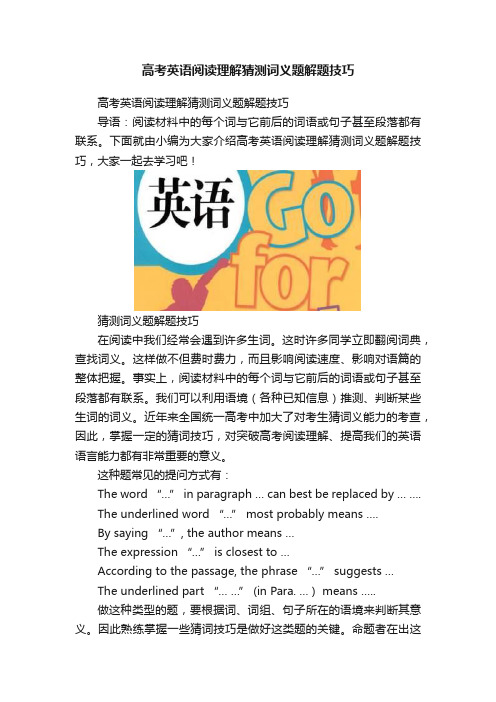
高考英语阅读理解猜测词义题解题技巧高考英语阅读理解猜测词义题解题技巧导语:阅读材料中的每个词与它前后的词语或句子甚至段落都有联系。
下面就由小编为大家介绍高考英语阅读理解猜测词义题解题技巧,大家一起去学习吧!猜测词义题解题技巧在阅读中我们经常会遇到许多生词。
这时许多同学立即翻阅词典,查找词义。
这样做不但费时费力,而且影响阅读速度、影响对语篇的整体把握。
事实上,阅读材料中的每个词与它前后的词语或句子甚至段落都有联系。
我们可以利用语境(各种已知信息)推测、判断某些生词的词义。
近年来全国统一高考中加大了对考生猜词义能力的考查,因此,掌握一定的猜词技巧,对突破高考阅读理解、提高我们的英语语言能力都有非常重要的意义。
这种题常见的提问方式有:The word “…” in paragraph … can best be replaced by … ….The underlined word “…” most probably means ….By saying “…”, the author means …The expression “…” is closest to …According to the passage, the phrase “…” suggests …The underlined part “… …” (in Para. … ) means …..做这种类型的题,要根据词、词组、句子所在的语境来判断其意义。
因此熟练掌握一些猜词技巧是做好这类题的关键。
命题者在出这类题时惯用常规词义来麻痹考生,我们要特别注意熟词生义,切不可脱离语境想当然。
猜测词义时,一般可利用以下三个方面的线索:一.针对性的解释针对性解释是作者为了更好的表达思想,在文章中对一些重要的概念、难懂的术语或高深的词汇等所做的通俗化的解释。
这些解释提供的信息明确具体,所使用的语言通俗易懂,利用它们来猜测词义就非常简单。
1.根据定义(definition)猜测词义如果生词有一个句子或段落来定义,那么理解这个句子或段落本身就是推断词义。
阅读理解如何猜测词义

阅读理解如何猜测词义作者:杨晓庆来源:《校本教研》2012年第05期在阅读中,同学们往往会遇到生词,这时大部分同学就会立即翻阅字典,查找词义,这样做既费时费力又影响做题速度及连贯思维。
因此,同学们需要学会在阅读过程中根据材料所提供的背景知识、相关信息,综合理解、猜测或推断某一生词的词义。
这种阅读技巧非常有用,同学们可以很快地通过上下文提供的线索及生词本上的结构猜出词义,从而有效的提高阅读速度和思维能力。
阅读中常用的猜测词义的方法如下:1.利用上下文提供的信息猜词任何一篇文章中的句子在内容上都不是绝对孤立的,都跟句子所在的段落及整篇文章有关。
利用上下文提供的情景和线索,进行合乎逻辑的综合分析而推测词义,是阅读过程中的关键,也会是高考的热点。
如Which of the following words can best take the place of the word “relish” in the passage?(A. choose B.enjoy C.prepare for D.carry on)由下文had brought along a dozen magazines to read and reread证明这旅途在作者看来很是无聊,答案为B。
2.利用定义猜词阅读文章中有些生词尤其是新闻报道及科普文体文章中的生词,往往在其后有对该词进行解释说明性的短语或句子,如to be, that is, mean, stand for, namely, to refer to, in other words 等,有时也一起同位语、定语从句的形式出现,或用破折号、括号来表示。
3.利用同义、近义词猜词通常情况下,英语忌讳实词重复。
避免重复的方法之一是利用同义词或近义词加以代替。
同义词替换的修饰方法可以为我们推测词义提供明显的语境线索。
标志词有:or, like, similarly 等。
如“When things are getting hard, a voice inside my head tells me that I can’t achieve something, Then, there are other distractions, such as family or hobbies. The key is to concentrate.What does the underlined word “distractions” probably refer to?A.Ways that help one to focus.B.Words that help one to feel less tense.C.Activities that turn one’s attention away.D.Habits that make it hard for one to relax.由下文“such as family or hobbies”可知,此处指可能会使作者分心的一些东西。
高考语文阅读理解中的词义猜测方法
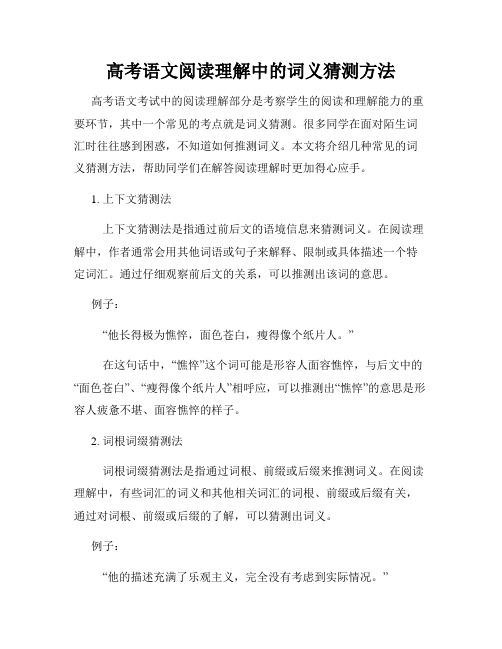
高考语文阅读理解中的词义猜测方法高考语文考试中的阅读理解部分是考察学生的阅读和理解能力的重要环节,其中一个常见的考点就是词义猜测。
很多同学在面对陌生词汇时往往感到困惑,不知道如何推测词义。
本文将介绍几种常见的词义猜测方法,帮助同学们在解答阅读理解时更加得心应手。
1. 上下文猜测法上下文猜测法是指通过前后文的语境信息来猜测词义。
在阅读理解中,作者通常会用其他词语或句子来解释、限制或具体描述一个特定词汇。
通过仔细观察前后文的关系,可以推测出该词的意思。
例子:“他长得极为憔悴,面色苍白,瘦得像个纸片人。
”在这句话中,“憔悴”这个词可能是形容人面容憔悴,与后文中的“面色苍白”、“瘦得像个纸片人”相呼应,可以推测出“憔悴”的意思是形容人疲惫不堪、面容憔悴的样子。
2. 词根词缀猜测法词根词缀猜测法是指通过词根、前缀或后缀来推测词义。
在阅读理解中,有些词汇的词义和其他相关词汇的词根、前缀或后缀有关,通过对词根、前缀或后缀的了解,可以猜测出词义。
例子:“他的描述充满了乐观主义,完全没有考虑到实际情况。
”在这句话中,“乐观主义”可能是一个合成词,通过对词根和前缀的分析,可以推测出“乐观主义”的意思是指对事物持乐观态度、坚信美好事物会发生的一种观点。
3. 比喻猜测法比喻猜测法是指通过词语的比喻或类比意义来推测词义。
在阅读理解中,有些词汇可能在字面意义上并不容易理解,但通过将其与其他相关词语进行比较或类比,可以推测出词义。
例子:“他的眼神如烈焰般炙热。
”在这句话中,“炙热”这个词用来形容眼神,通过与“烈焰”进行比喻,可以推测出“炙热”的意思是形容眼神充满激情和热情的样子。
4. 示意词猜测法示意词猜测法是指通过作者提供的示意词来推测词义。
在阅读理解中,有些词汇可能作者会附带提供近义词或近义短语,以便帮助读者推测出词的意思。
例子:“这种冷饮味道极为独特,酸甜可口。
”在这句话中,作者通过提供“酸甜可口”这个示意词,可以推测出“味道极为独特”的意思是指冷饮有一种与众不同的、酸甜可口的味道。
阅读理解中猜词的十种技巧

⼀、根据释义猜测词义在有些⽂章中,某些⽣词的词义在下⽂中可以得到解释或说明。
这些解释有时以定义、定语从句、同位语形式出现;有时⽤破折号、括号、冒号、引号等符号引出;还有时⽤that is,or,that is to say,in other words等次引出。
例如:1.Anthropology is the scientific study of man.有定义可知,anthropology就是“研究⼈类的科学”,由此可推出anthropology是“⼈类学”。
2.He takes a special interest in botany which concerns the study of plants.根据定语从句中which concerns the study of plants 可知botany是“植物学”。
3.Capacitance,the ability to store electric charge,is one of the most common characteristics of electronic circuits.由同位语我们可以很快猜出⽣词capacitance的词义——————电容量。
4.The doctor was on the night-shift—from midnight to 8 o'clock.这⾥night-shift的意思可以由破折号后⾯的内容猜出,意思是“夜班”。
5.They are vertebrates,that is,animals that have backbones.这⾥vertebrates的意思可以由that is后⾯的内容猜出,意思是“脊椎动物”。
⼆、通过下⽂所举的例⼦猜测词义在有些⽂章中,下⽂所举的例⼦给读者提供了猜测⽣词的重要线索。
例如:Generally,we like to read periodicals,such as Time Magazine,Newsweek,Reader’sDigest,etc.根据后⾯所举的例⼦可以推断出periodicals的意思是“期刊”。
语文阅读理解解释词语的方法
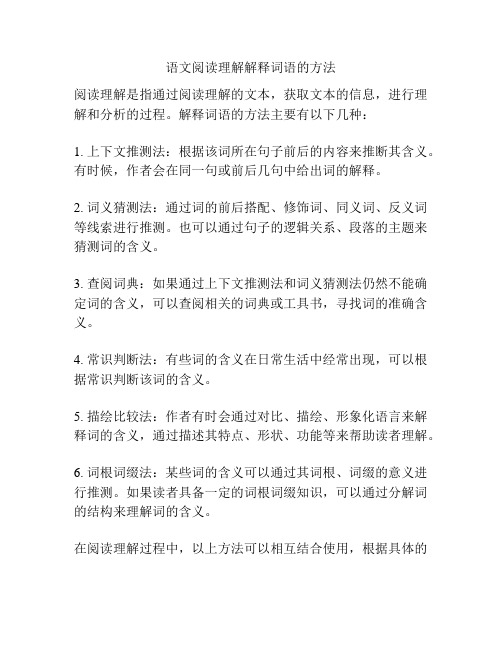
语文阅读理解解释词语的方法
阅读理解是指通过阅读理解的文本,获取文本的信息,进行理解和分析的过程。
解释词语的方法主要有以下几种:
1. 上下文推测法:根据该词所在句子前后的内容来推断其含义。
有时候,作者会在同一句或前后几句中给出词的解释。
2. 词义猜测法:通过词的前后搭配、修饰词、同义词、反义词等线索进行推测。
也可以通过句子的逻辑关系、段落的主题来猜测词的含义。
3. 查阅词典:如果通过上下文推测法和词义猜测法仍然不能确定词的含义,可以查阅相关的词典或工具书,寻找词的准确含义。
4. 常识判断法:有些词的含义在日常生活中经常出现,可以根据常识判断该词的含义。
5. 描绘比较法:作者有时会通过对比、描绘、形象化语言来解释词的含义,通过描述其特点、形状、功能等来帮助读者理解。
6. 词根词缀法:某些词的含义可以通过其词根、词缀的意义进行推测。
如果读者具备一定的词根词缀知识,可以通过分解词的结构来理解词的含义。
在阅读理解过程中,以上方法可以相互结合使用,根据具体的
上下文和语境,灵活选择合适的方法,提高对文本中词语含义的理解和掌握。
阅读理解中的词义猜测技巧及练习

阅读理解中的词义猜测技巧及练习阅读理解是学习过程中必不可少的一项技能,而在阅读理解过程中,词义猜测是非常重要的一环。
通过正确猜测词义,我们能更好地理解文章内容,提高阅读效果。
本文将介绍一些词义猜测的技巧,并提供一些练习。
一、从上下文推测词义在阅读理解中,我们可以通过上下文的线索来推测生词的词义。
上文或下文中的其他单词、短语、句子可以提供关于生词意义的信息。
例如:1. 同义词法推测:当遇到一个生词时,我们可以寻找上下文中是否有与其意思相近的词,从而推测出生词的意义。
比如,当我们遇到"tiny"这个生词,而在上文中提到了"small"这个词,我们可以推测出"tiny"的意思是非常小的。
2. 反义词法推测:有时,我们可以通过寻找上下文中的反义词来推测生词的意义。
例如,当遇到"happy"这个生词时,在上文中提到了"unhappy",我们可以推测"happy"的意思是快乐的。
3. 举例法推测:在阅读理解中,有时会出现对生词进行解释的例子。
例如,当遇到一个生词"pessimistic"时,下文中提到了"always seeing the negative side",我们可以推测出"pessimistic"的意思是看问题时总是看到负面的。
二、根据词缀推测词义词缀是词根的前缀或后缀,可以给出单词的一些含义线索。
通过熟悉常见的词缀,我们可以在阅读理解中更准确地猜测生词的意义。
例如:1. 前缀推测:当遇到以"un-"作为前缀的生词时,我们可以推测出它们有否定的意思。
比如,"unclear"的意思是不清楚的,"unhappy"的意思是不快乐的。
2. 后缀推测:当遇到以"-ful"作为后缀的生词时,可以推测出它们表示充满某种特性或具有某种特性。
阅读——如何猜测词汇意思

三,根据内在逻辑关系推测词义 根据内在逻辑关系推测词义是指 运用语言知识分析和判断相关信 息之间存在的逻辑关系,然后根 据逻辑关系推断生词词义或大致 义域。
根据对比关系猜测词义
在一个句子或段落中,有对两个事 物或现象进行对比性的描述,我们可以根据生词 或难词的反义词猜测词义。表示对比关系的词汇和 短语主要有though,unlike,not,but,however,despite,in spite of,in contrast,while等引导或连接的句子。 例如:
1.It will be competing for the Palmed’Or,the festival’s top prize. 点拨 本句中的Palmed’Or是个外来词,当然是我们 不能理解的词语。但它后面的解释清楚地告 诉我们,它就是这个节日的最高奖项的名称 2.Modern medicine began with the stethoscope,a medical tool used for listening to the movements of a person’s lungs and his heartbeats. 点拨 对绝大多数同学来说这个词是个生词,但后 面的解释会使我们一目了然,很快就可以推 测出它的意思是“听诊器”。
2.I’m illiterate about such things.
点拨 本句的词根literate意为“有文化修养的, 通晓的”,前缀il-表示否定,因此illiterate 指“一窍不通的、不知道的”。
3.Car rentals are becoming more and more popular as an inexpensive way of taking to roads. 点拨
文字推理猜测词义的技巧与方法

文字推理猜测词义的技巧与方法字词是语言的基本单位,正确理解字词的意义对于阅读和沟通至关重要。
然而,在阅读过程中,我们难免会遇到一些生疏或不熟悉的词汇,这时候就需要运用文字推理的技巧来猜测词义。
本文将介绍几种常见的文字推理猜测词义的技巧与方法,帮助读者提高词汇理解能力。
一、上下文暗示法上下文暗示法是最常用的推理词义的方法之一。
通过把握上下文的逻辑关系,利用前后文的线索以及语境信息来推测词义。
上下文暗示法可以分为词法推理和句法推理两种。
词法推理是通过关注前后词汇的关系来推测词义。
比如,在下列句子中,“她慈祥地看着我,眼中闪烁着聪明的光芒。
”根据前后词的关系,我们可以猜测出“慈祥”和“聪明”可能是正面的词义。
句法推理则是通过分析句子结构和语法关系来进行推测。
比如,“我们应该采取灵活的措施,才能有效应对这个问题。
”在这个句子中,“灵活”的词义可以通过对比“措施”和“有效”来进行推断。
二、词根词缀法词根词缀法是通过对单词中的词根和词缀进行分析,推断出词义。
英语中,很多单词都是由词根和词缀构成的,词根和词缀中包含的信息可以帮助我们推测出单词的意义。
比如,“biology(生物学)”一词中,“bio-”表示“生命”,“-logy”表示“学科”,通过分析词根词缀,我们可以推测出biology的意义是“生物学”。
三、同义词反义词法同义词反义词法是通过寻找句子中与目标词义相似或相反的词汇来猜测词义。
如果我们在阅读中遇到一个生词,但是句子中同时出现了一个我们熟悉的词,而这个熟悉的词和生词有着相似的意义,那么我们可以推测出生词的意义和这个熟悉的词相同或相似。
反之,如果一个生词和我们熟悉的词反义关系,那么我们可以推测生词的意义和熟悉的词相反。
通过这种方法,我们可以有效地推测出生词的意义,提高词汇的理解能力。
四、文化背景法语言是文化的一部分,很多词汇的意义在不同的文化背景下会有所不同。
因此,了解文化背景可以帮助我们更好地理解词义。
- 1、下载文档前请自行甄别文档内容的完整性,平台不提供额外的编辑、内容补充、找答案等附加服务。
- 2、"仅部分预览"的文档,不可在线预览部分如存在完整性等问题,可反馈申请退款(可完整预览的文档不适用该条件!)。
- 3、如文档侵犯您的权益,请联系客服反馈,我们会尽快为您处理(人工客服工作时间:9:00-18:30)。
高考备考专项:阅读理解猜测词意1.If you have a juicer, you can simply feed in frozen bananas and some berries or sliced fruit. Out comes a “soft-serve”creamy dessert, to be eaten right away. This makes a fun activity for a children’s party; they love feeding the fruit and frozen bananas into the top of the machine and watching the ice cream come out below.What is “a juicer” in the last paragraph?A. A dessert.B. A drink.C. A container.D. A machine.2. Adults understand what it feels like to be flooded with objects. Why do we often assume that more is more when it comes to kids and their belongings? The good news is that I can help my own kids learn earlier than I did how to live more with less. What do the words “more is more”in paragraph 1 probablymean?A. The more, the better.B. Enough is enough.C. More money, more worries.D. Earn more and spend more.3. There are also varieties developed to suit specific local conditions. One of the very best varieties for eating quality is Orleans Reinette, but you'll need a warm, sheltered place withperfect soil to grow it, so it'sa_pipe_dream for most apple lovers who fall for it.What does the underlined phrase “a pipe dream” in Paragraph 3 mean?A.A practical idea. B.A vain hope.C.A brilliant plan. D.A selfish desire.4. This of course created a new problem: dirt practically buried the first floors of every building in Chicago. Building owners were faced with a choice: either change the first floorsof their buildings into basements, and the second st ories into main floors, or hoist the entire buildings to meet the new street level. Small woodframe buildings could be lifted fairly easily.The underlined word “hoist”in Paragraph 4 means“________”.A.change B.liftC.repair D.decorate5. Some 2,500 years ago Greece discovered freedom. Before that there was no freedom. There were great civilizations, splendid empires, but no freedom anywhere. Egypt and Babylon wereboth tyrannies,_ one very powerful man ruling over helpl ess masses.What does the underlined word“tyrannies”in Paragraph 2 refer to?A.Countries where their people need help.B.Powerful states with higher civilization.C.Splendid empires where people enjoy freedom.D.Governments ruled with absolute power.6. The objects around you are visible because they interact with light.Light typically travels in a straight line.But some materials slow and scatter (散射) light,bouncing it away from its original path.Others absorb light,stopping it dead in its tracks.Both scattering and absorption make an object look different from other objects around it,so you can see it easily.The underlined word “dead” in Paragraph 3 means ________.A.silently B.graduallyC.regularly D.completely7. My color television has given me nothing but a headache.I was able to buy it a little over a year ago because I had my relativesgive me money for my birthday instead of a lot of clothes that wouldn’t fit.I let a salesclerk fool me into buying a discontinued model.I realized this a day later,when I saw newspaper advertisements for the set at seventyfive dollars less than I had paid.The set worked so beautifully when I first got it home that I would keep it on until stations signed_off for the night.Fortunately,I didn’t get any channels showing allnight movies or I would never have gotten to bed.Which of the following can best replace the phrase “signed off” in Paragraph 1?_______A.ended all their programsB.provided fewer channelsC.changed to commercialsD.showed allnight movies真题短文读一读A man’s position among the black-tent people depends on his ancestors, relatives, and fellow tribesmen. If they are honored, he isalso honored. If they are disgraced, he too is disgraced. Therefore one carefully guards the honor of his family, his lineage(宗系), and his tribe.The word “disgrace” means _________ in this text.A. honorB. endangerC. proudD. shameThe ruler had been so cruel and dishonest that after the revolution he was banished. A few members of the Senate(参议院) opposed this decision, but the majority voted that the ruler should leave the country for ever.The underlined word “banished” mean_______.A. killed by stoningB. sent awayC. imprisonedD. punished by whippingAlthough he often had the chance, Mr. Brown was never able to steal money from a customer. This would endangered his position at the bank, and he did not want to jeopardize his future.The word “jeopardize” means _____ in this text.A. protectB. endangerC. continueD. stopIt was once common to regard Britain as a society with class distinction. Each class had unique characteristics.In recent years, many writers have begun to speak the 'decline of class' and 'classless society' in Britain. And in modern day consumer society everyone is considered to be middle class.But pronouncing the death of class is too early. A recent wide-ranging society of public opinion found 90 percent of people still placing themselves in particular class; 73 percent agreed that class was still a vital part of British society; and 52 percent thought there were still sharp class differences. Thus, class may not be culturallyand politically obvious, yet it remains an important part of British society. Britain seems to have a love of stratification.42. The word stratification in Paragraph 3 is closest in meaning to ________.A. varietyB. divisionC. authorityD. qualificationThe link between what the men had done as boys and how they turned out as adults was surprisingly sharp. Those who had donethe most boyhood activities were twice as likely to have warmrelations with a wide variety of people, five times as likely to be well paid and 16 times less likely to have been unemployed. The researchers also found that IQ and family social and economic class made no real difference in how the boys turned out. Working----at any age----is important. Childhood activities help a child develop responsibility, independence, confidence and competence---the underpinnings (基础) of emotionalhealth. T hey also help him understand that people must cooperate and work toward common goals. The most competent adults are those who know how to do this. Yet work isn’t everything. As Tolstoy once said, “One can livemagnificently in this world if one knows how to work and how to love, to work for the person one loves and to love one’s work.”49. What does the underlined word “sharp”probably mean inParagraph 4?A. Quick to reactB. Having a thin edgeC. Clear and definiteD. sudden and rapidIn fact, when it comes to the art of war, ants have no equal. They are completely fearless and will readily take on a creature much larger than themselves, attacking in large groups and overcoming their target. Such is their devotion to the common good of the colony that not only soldier ants but also worker ants will sacrifice their lives to help defeat an enemy.Behaving in this selfless and devoted manner, these little creatures have survived on Earth, for more than 140 million years, far longer than dinosaurs. Because they think as one, they have a collective (集体的) intelligence greater than you would expect from its individual parts.70. What does the underlined expression "take on" in Paragraph 3 mean?A. Accept.B. Employ.C. Play with.D. Fight against.Once when I was facing a decision that involved high risk, I went to a friend. He looked at me for a moment, and then wrote a sentence containing the best advice I’ve ever had: Be bold and brave—and mighty(强大的) forces will come to your aid.Those words made me see clearly that when I had fallen short in the past, it was seldom because I had tried and failed. It was usually because I had let fear of failure stop me from trying at all. On the other hand, whenever I had plunged into deep water, forced by courage or circumstance, I had always been able to swim until I got my feet on the ground again.Boldness means a decision to bite off more than you are sure you can eat. And there is nothing mysterious about the mighty forces. They are potential powers we possess: energy, skill, sound judgment, creative ideas—even physical strength greater than most of us realize.52. What is the implied meaning of the underlined part?A. Swallow more than you can digest.B. Act slightly above your abilities.C. Develop more mysterious powers.D. Learn to make creative decisions.“In the 1960s we were all a little wild and couldn’t get away from home far enough or fast enough to prove we could do it on our own,”says Christine Crosby, publisher of Grand, a magazine for grandparents. “We now realize how important family is and how important it is to be near them, especially when you’re raising children.”27. What did Crosby say about people in the 1960s?A. They were unsure of themselves.B. They were eager to raise more children.C. They wanted to live away from their parents.D. They had little respect for their grandparents.Recently, an old milk box in the countryside I saw brought back my childhood memories. I took it home and planted it in the back porch (门廊). Every so often my son’s friends will ask what it is. So I started stories of my boyhood, and of the milkman who brought us friendship along with his milk.59. Why did the author bring back home an old milk box?A. He missed the good old days.B. He wanted to tell interesting stories.C. He needed it for his milk bottles.D. He planted flowers in it.Encouraging this kind of thinking has a downside. I ran the risk of losing those students who had a different style of thinking. Without fail one would declare, “But I’m just not creative.”27. What does the underlined word “downside”in Paragraph 4 probably mean?A. Mistake.B. Drawback.C. Difficulty.D. Burden.Members go on the site and register the books they own and would like to share. BookCrossing provides an identification number to stick inside the book. Then the person leaves it in a public place, hoping that the book will have an adventure, traveling far and wide with each new reader who finds it.30. What does the underlined word “it” in Paragraph 2 refer to ?A. The book.B. An adventure.C. A public place.D. The identification number.He was judged unfit to return to sea and took a shore job in Glasgow for the rest of the war. For as long as I can remember, he had a weak heart. Mother said it was caused by the torpedoes. He said it was because of the cigarettes.Whichever, he died suddenly in his early 50s.63.The underlined word “it” in Paragraph 6 refers to the father’s ____.A. weak heartB. taking a shore jobC. failure to return to seaD. injury caused by a torpedo……Second, the quality of your relationships depends on the amount of time you invest(投入)in them. We invest a lot in a small number of people and then distribution what’s left among as many others as we can. The problem is that if we invest little time in a person, our engagement with that person will decline(减弱)until eventually it dies into “someone I once knew”.73. The underlined word “engagement” in the second paragraph probably means “”.A. appointmentB. connectionC. interviewD. agreementThere are also varieties developed to suit specific local conditions. One of the very best varieties for eating quality is Orleans Reinette, but you'll need a warm, sheltered place with perfect soil to grow it, so it's a pipe dream for most apple lovers who fall for it.What does the underlined phrase “a pipe dream”in Paragraph 3 mean?A. A practical idea.B. A vain hope. (白日梦)C. A brilliant plan.D. A selfish desire.“My friends said: ‘Now we believe your stories,’” Welty added. “And I said: ‘Now you know. These are the people that make me write them.’”The underlined word “them”in Paragraph 6 refers to Welty's _______.A. readersB. partiesC. friendsD. stories高考英语阅读理解猜测词意参考答案1.If you have a juicer, you can simply feed in frozen bananas and some berries or sliced fruit. Out comes a “soft-serve”creamy dessert, to be eaten right away. This makes a fun activity for a children’s party; they love feeding the fruit and frozen bananas into the top of the machine and watching the ice cream come out below.What is “a juicer” in the last paragraph?A. A dessert.B. A drink.C. A container.D. A machine.解析:they love feeding the fruit and frozen bananas into the top of the machine and watching the ice cream come out below.孩子们喜欢把水果和冷冻的香蕉放到机器的顶部,看着冰激凌出来,因此此处 a juicer是机器。
